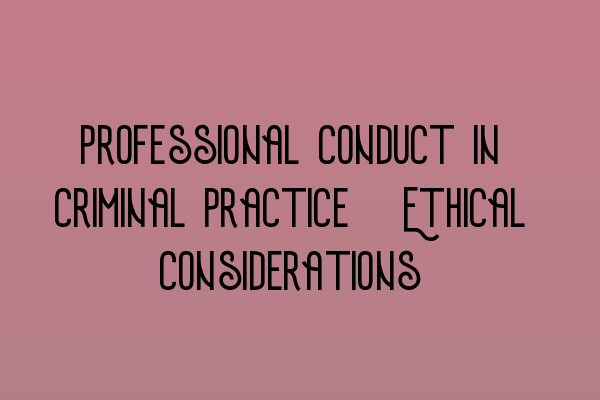Professional Conduct in Criminal Practice: Ethical Considerations
In the field of criminal law, professional conduct and ethical considerations play a crucial role in maintaining the integrity of the legal profession. As solicitors at SQE Criminal Law & Practice Law UK, we are committed to upholding the highest ethical standards in our practice. In this article, we will explore the important ethical considerations that every criminal law practitioner should be aware of.
Ethics and Professional Responsibility
Professional conduct goes beyond mere adherence to the law; it encompasses ethical principles that guide our actions as solicitors. It is essential to act in the best interests of our clients while maintaining the integrity of the legal system.
One key aspect of professional conduct is ensuring client confidentiality. As solicitors, we have a duty to protect privileged information shared by our clients. This duty extends to maintaining strict confidentiality even after the conclusion of a case. By safeguarding client confidentiality, we build trust and confidence in our profession.
Another crucial ethical consideration is avoiding conflicts of interest. Solicitors must identify and address any potential conflicts between the interests of their clients and their own personal, financial, or professional interests. This ensures that our clients’ needs are always prioritized and that we provide unbiased and objective legal advice.
The Role of Trust and Honesty
Trust and honesty are the foundations of an effective solicitor-client relationship. As professionals, we have a duty to act with integrity and honesty in all our interactions. This includes providing clients with accurate and truthful information, even if it may be unfavorable.
Additionally, ethical considerations dictate that solicitors must not deceive the court or engage in any form of dishonesty. It is our responsibility to present the facts and arguments in a truthful and transparent manner, ensuring that justice is served and the legal process is upheld.
Ethics in Criminal Practice
When practicing criminal law, solicitors face unique ethical challenges. It is essential to maintain professional conduct while navigating the complexities of criminal cases.
Integrity is paramount when dealing with criminal clients. It is our duty to provide competent representation, diligently pursue their interests, and ensure a fair trial. This includes ethical obligations such as respecting the presumption of innocence, upholding the right to legal representation, and promoting access to justice.
Furthermore, solicitors practicing criminal law must be mindful of their role in the administration of justice. It is crucial to balance the duty to advocate for clients with the duty to promote a just and fair legal system. This includes avoiding any conduct that may undermine the administration of justice or bring the legal profession into disrepute.
Conclusion
Professional conduct and ethical considerations are at the core of practicing criminal law. As solicitors at SQE Criminal Law & Practice Law UK, we are committed to upholding the highest ethical standards. By prioritizing client confidentiality, avoiding conflicts of interest, and maintaining trust and honesty, we strive to provide exceptional legal representation while preserving the integrity of the legal profession.
For more information about legal representation and ethical practices, check out the following related articles:
- Legal Representation for Delaware LLCs in the UK: Expert Advice
- Ensuring Ethical Business Practices: Delaware’s Code of Conduct
- Legal Challenges for UK Businesses in the U.S.: Strategies for Overcoming Hurdles
- Legal Challenges for UK Businesses in the U.S.: Strategies for Overcoming Hurdles
- SQE Exam Prep: Essential Study Materials for Aspiring Solicitors
